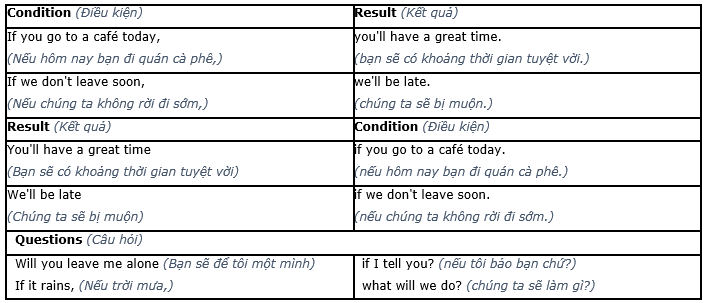Hãy nhập câu hỏi của bạn vào đây, nếu là tài khoản VIP, bạn sẽ được ưu tiên trả lời.

2. Choose the correct words in the Rules.
(Chọn các từ đúng để hoàn thành Quy luật.)
RULES |
1. We use some / any in questions. 2. We use Yes, there is and No, there isn't with singular nouns / plural nouns. 3. We use Yes, there are and No, there aren't with singular nouns / plural nouns. 4 We use How many ... ? with singular nouns / plural nouns. |

RULES (Quy tắc)
1. We use much with uncountable nouns.
(Chúng ta dùng much với danh từ không đếm được.)
2. We use many with countable nouns.
(Chúng ta dùng many với danh từ đếm được.)
3. We often use any, much and many in questions and negative sentences.
(Chúng ta thường dùng any, much và many trong câu hỏi và câu phủ định.)
4. We use some, any and a lot of with countable and uncountable nouns.
(Chúng ta thường dùng some, any và a lot of với danh từ đếm được và danh từ không đếm được.)

RULES (Quy tắc)
1. We use the first conditional to talk about a condition in the future and the result of this condition.
(Chúng ta sử dụng điều kiện loại 1 để nói về một điều kiện trong tương lai và kết quả của điều kiện này.)
2. We describe the condition with if + present simple.
(Chúng ta mô tả điều kiện với if + thì hiện tại đơn.)
3. We describe the result with will + infinitive.
(Chúng ta mô tả kết quả với will + động từ nguyên thể.)
4. The sentence can start with the condition or the result. If it starts with the result, we don't use a comma.
(Câu có thể bắt đầu bằng điều kiện hoặc kết quả. Nếu nó bắt đầu bằng kết quả, chúng ta không sử dụng dấu phẩy.)
5. We never use if + will: If you will go, I'll be happy.
(Chúng ta không bao giờ sử dụng if + will.)

RULES (QUY TẮC)
1. Regular verbs have got past simple forms ending in -ed.
(Động từ có quy tắc có hình thức quá khứ đơn kết thúc là -ed.)
2. Irregular verbs haven't got past simple forms ending in -ed.
(Động từ bất quy tắc không có hình thức quá khứ đơn kết thúc bằng -ed.)
3. Verbs in the past simple have got the same form for I, you, he, she, it, we and they.
(Các động từ ở quá khứ đơn có cùng dạng với I, you, he, she, it, we và they.)

Complete the text with the correct prepositions.
We have English lessons (1) ...............in............ Room 18. There are 24 tables for students and one desk for the teacher. (2) ...........on................ the walls, there are lots of posters of England. There's a cupboard at the front of the room and (3) .......on.................... the cupboard, there's a TV and DVD player. Sometimes we watch films. There are some bookshelves (4) ...............in............ the classroom. (5) ...........on................ the shelves, There are a lot of English books. Our books are (6) ..............on............. the teacher's desk. He wants to look at our homework. Our school bags are (7) ..........on................. the floor, and there is some food (8) .......in.................... the school bags. It's now 5.30 pm. We are (9) .............at.............. home, but our teacher is (10) ...........at................ school. He often stays late to prepare for tomorrow's lessons.
Complete the text with the correct prepositions.
We have English lessons (1) ..............IN............. Room 18. There are 24 tables for students and one desk for the teacher. (2) ................ON........... the walls, there are lots of posters of England. There's a cupboard at the front of the room and (3) ...................ON........ the cupboard, there's a TV and DVD player. Sometimes we watch films. There are some bookshelves (4) .........IN.................. the classroom. (5) ..................ON......... the shelves, There are a lot of English books. Our books are (6) .................ON.......... the teacher's desk. He wants to look at our homework. Our school bags are (7) ..................ON........ the floor, and there is some food (8) ...............IN............ the school bags. It's now 5.30 pm. We are (9) ...........AT................ home, but our teacher is (10) .....AT...................... school. He often stays late to prepare for tomorrow's lessons.

1. We're going to travel by train.
(Chúng ta sẽ đi du lịch bằng tàu hỏa.)
2. I am going away.
(Tôi sắp đi xa.)
3. What are you going to do this summer?
(Bạn định làm gì vào mùa hè này?)

Complete the sentence with possessive adjectives
1.They are in____my___ bedroom
2.We are in ___our___classroom
3.She's in___her___car
4.He's in ___his___house
5.You're in___your___school
6.The dog's in____basket


1 singular
2 plural